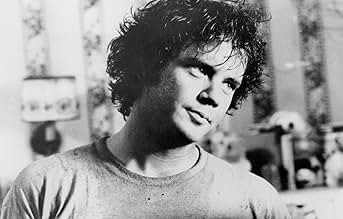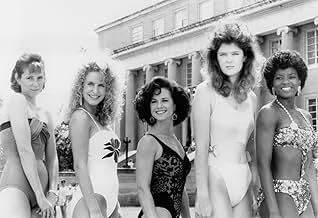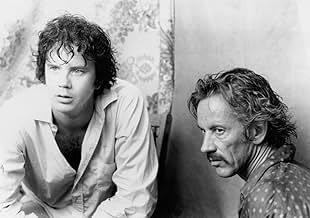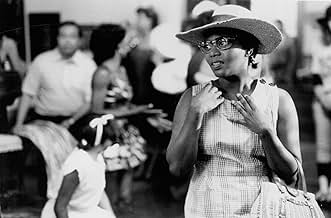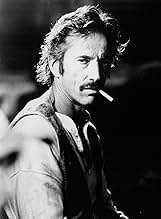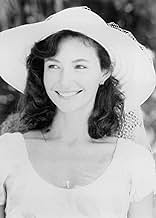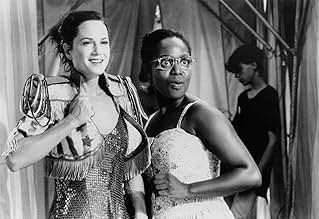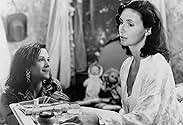NOTE IMDb
6,0/10
2,5 k
MA NOTE
Ajouter une intrigue dans votre langueCarnelle wants to escape her dreary life, so she enters a local beauty contest, much to everyone's dismay.Carnelle wants to escape her dreary life, so she enters a local beauty contest, much to everyone's dismay.Carnelle wants to escape her dreary life, so she enters a local beauty contest, much to everyone's dismay.
- Réalisation
- Scénario
- Casting principal
- Récompenses
- 1 nomination au total
Avis à la une
After my first viewing of this film I came away disappointed, but Holly Hunter's sound performance induced me to watch it again. A second viewing left me with the impression that it was an opportunity lost to produce a first class movie. A poor performance from a star like Tim Robbins, who has played outstanding roles in other movies, leads me to suspect that the fault lies with the director.
Holly Hunter rose to the occasion to make the film worth while. I would recommend that anyone watching this movie should focus there attention on Holly Hunter's flawless performance and ignore weak moments that occur from time to time elsewhere.
I would purchase the DVD again and classify it as a "keeper".
Holly Hunter rose to the occasion to make the film worth while. I would recommend that anyone watching this movie should focus there attention on Holly Hunter's flawless performance and ignore weak moments that occur from time to time elsewhere.
I would purchase the DVD again and classify it as a "keeper".
A much under-rated movie: both a satire on the sheer awfulness of small-town pageants, and a poignant yet ultimately hopeful romance about talented misfits coming to terms with their nature. A minor criticism is that it suffers from the usual movie cliche: characters who are supposed to be plain - in this case, Holly Hunter and Alfre Woodard - who are the most charismatic people in the movie. Highlight: the amazing dance routine by Hunter. I'm an old cynic, but the ending was both iconoclastic and beautifully feelgood.
A hilarious sendup of beauty contests, with a nice wry twist and laugh out loud southern humor. Wacky characters, well casted and good solid acting. Mary Steenburgen is wonderful and Holly Hunter is the best! You may not get if if you are not from the South and if you are "serious" about beauty pageants.
"Physiognomy": the act of judging people by their physical appearance.
As in her first film, the Pulitzer Prize-winning Crimes of the Heart, Beth Henley has created a collection of off-beat Southern Gothic characters. These characters seem familiar like old friends (or more like black-sheep cousins), ut the film goes beyond its representation of these endearing characters to explore deeper themes, to ask whether appearances are really important.
The Miss Firecracker Contest, is superficially, a comedy about a small town Southern beauty pageant, in which Henley reflects in a sardonic manner on how and why women put themselves through such contests. The pageant, however, merely frames the action. The play is ultimately about appearances. Henley introduces the idea that women shape their identities and bodies in terms of the opinions of other people, and the more important issue of breaking away from stereotypes in order to discover your personality. The beauty pageant is even held on the Fourth of July -- Independence Day.
All of the women in this play, except Popeye, define themselves in relation to the contest. Staying with Henley's successful formula of an insecure heroine who searches for acceptance from society and her family, The Miss Firecracker Contest is dominated by the beauty queen "wannabe," Carnelle Scott (a role created on stage by then little-known Southern actress Holly Hunter). Carnelle is not merely competing for the crown; she wants to win the contest so that she can win acceptance from the town of Brookhaven, Mississippi, shed her tawdry reputation, and leave the town in a "crimson blaze of glory." Carnelle's own name even expresses her sexual nature -- the derivation of her name, "carnal," means pleasures of a sexual nature.
Her cousin and idol, Elain, is a self-absorbed former pageant winner -- a Scarlett O'Hara for the twentieth century -- still living off the glory of her youth. Even Tessy Mahoney, one of the two ugliest girls in town, takes pleasure in the authority of the whistle and clipboard she wields as pageant coordinator. Of the women, only Popeye -- with her coke-bottle glasses -- is more concerned with "seeing" than with being seen. An admirer of beauty that transcends physical appearance, she serves as a mirror through which others may see their own self-worth.
The Miss Firecracker Contest continues Beth Henley's examination of the South -- and especially of small-town Southern women. In pursuing this theme, she is following in the steps of earlier Southern playwrights, such as Lillian Hellman and Tennessee Williams. And like Southern author William Faulkner with his fictitious county of Yoknapatawpha, Mississippi, Henley appears to be establishing a physical universe and a cast of familiar characters for her canon of plays.
As in her first film, the Pulitzer Prize-winning Crimes of the Heart, Beth Henley has created a collection of off-beat Southern Gothic characters. These characters seem familiar like old friends (or more like black-sheep cousins), ut the film goes beyond its representation of these endearing characters to explore deeper themes, to ask whether appearances are really important.
The Miss Firecracker Contest, is superficially, a comedy about a small town Southern beauty pageant, in which Henley reflects in a sardonic manner on how and why women put themselves through such contests. The pageant, however, merely frames the action. The play is ultimately about appearances. Henley introduces the idea that women shape their identities and bodies in terms of the opinions of other people, and the more important issue of breaking away from stereotypes in order to discover your personality. The beauty pageant is even held on the Fourth of July -- Independence Day.
All of the women in this play, except Popeye, define themselves in relation to the contest. Staying with Henley's successful formula of an insecure heroine who searches for acceptance from society and her family, The Miss Firecracker Contest is dominated by the beauty queen "wannabe," Carnelle Scott (a role created on stage by then little-known Southern actress Holly Hunter). Carnelle is not merely competing for the crown; she wants to win the contest so that she can win acceptance from the town of Brookhaven, Mississippi, shed her tawdry reputation, and leave the town in a "crimson blaze of glory." Carnelle's own name even expresses her sexual nature -- the derivation of her name, "carnal," means pleasures of a sexual nature.
Her cousin and idol, Elain, is a self-absorbed former pageant winner -- a Scarlett O'Hara for the twentieth century -- still living off the glory of her youth. Even Tessy Mahoney, one of the two ugliest girls in town, takes pleasure in the authority of the whistle and clipboard she wields as pageant coordinator. Of the women, only Popeye -- with her coke-bottle glasses -- is more concerned with "seeing" than with being seen. An admirer of beauty that transcends physical appearance, she serves as a mirror through which others may see their own self-worth.
The Miss Firecracker Contest continues Beth Henley's examination of the South -- and especially of small-town Southern women. In pursuing this theme, she is following in the steps of earlier Southern playwrights, such as Lillian Hellman and Tennessee Williams. And like Southern author William Faulkner with his fictitious county of Yoknapatawpha, Mississippi, Henley appears to be establishing a physical universe and a cast of familiar characters for her canon of plays.
I might have enjoyed this movie more had I not already been very familiar with The Miss Firecracker Contest, the award-winning play on which the screenplay is based. The play is as neat and compact as the film is muddled and overblown. I loved the play and was disappointed to see that some of my favorite elements were changed for the film. The play is set in Brookhaven, MS, has a cast of six, and plays like a symphony with recurring themes and a distinct rhythm. The film moves the action to Yazoo City, a somewhat more industrial setting, so it loses some of the "southern charm" of the play. The film shows us the other contestants, the audience members, and various other members of the community. This "carnival atmosphere" distracts us from the core issues of the play, which are Carnelle's relationship with her family and her need to find her place in the world. Although I feel that Alfre Woodard did a stellar job in portraying Popeye Jackson, this role was originally written as a very backwoods white girl. The change to a black character made it impossible to keep the very sweet romance between her and Delmount in the screenplay. In the film, Elaine, played marvelously by Mary Steenburgen, displays a certain mean streak which is absent in the play.
In conclusion, Miss Firecracker is a very well-acted but overly busy adaptation of a beautifully succinct play about a very eccentric southern family. I recommend the movie for the performances of Holly Hunter, Mary Steenburgen, Tim Robbins, and especially, Alfre Woodard. I also recommend reading or seeing the play to really understand the core characters and their relationships to one another.
In conclusion, Miss Firecracker is a very well-acted but overly busy adaptation of a beautifully succinct play about a very eccentric southern family. I recommend the movie for the performances of Holly Hunter, Mary Steenburgen, Tim Robbins, and especially, Alfre Woodard. I also recommend reading or seeing the play to really understand the core characters and their relationships to one another.
Le saviez-vous
- AnecdotesFilm is in memory of actor Trey Wilson who played Benjamin Drapper.
- Citations
Delmount Williams: Please, don't make me treat you like dogs. I don't want to treat you like common dogs.
- Bandes originalesSurrender
Written by Doc Pomus (as D. Pomus), Mort Shuman (as M. Schuman) and Ernesto De Curtis (uncredited)
Performed by Elvis Presley
Courtesy of RCA Records
Meilleurs choix
Connectez-vous pour évaluer et suivre la liste de favoris afin de recevoir des recommandations personnalisées
- How long is Miss Firecracker?Alimenté par Alexa
Détails
Box-office
- Montant brut aux États-Unis et au Canada
- 1 852 655 $US
- Week-end de sortie aux États-Unis et au Canada
- 45 293 $US
- 30 avr. 1989
- Montant brut mondial
- 1 852 655 $US
- Durée1 heure 42 minutes
- Couleur
- Mixage
- Rapport de forme
- 1.85 : 1
Contribuer à cette page
Suggérer une modification ou ajouter du contenu manquant

Lacune principale
By what name was Miss Firecracker (1989) officially released in India in English?
Répondre

